Marijuana as a recreational drug is now legal in Washington and Colorado, and it’s legal medicinally in 18 other states. But a recent research paper raises legitimate questions about the drug’s safety. One of proponent’s main arguments in favor of legalized marijuana has been the absence of overdose deaths associated with sole use of the drug. The article calls that assertion into question.
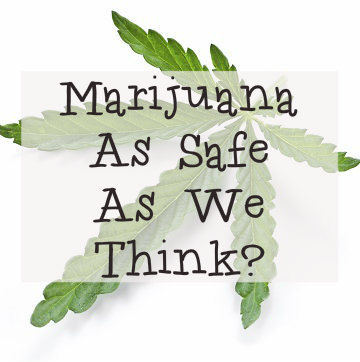 Public perception is that a person who uses marijuana on its own is safe. In fact, a 2011 U.K. Department of Health report said “no cases of fatal overdose have been reported” due to marijuana use and “no confirmed cases of human deaths” had been found.
Public perception is that a person who uses marijuana on its own is safe. In fact, a 2011 U.K. Department of Health report said “no cases of fatal overdose have been reported” due to marijuana use and “no confirmed cases of human deaths” had been found.
The new report suggests that marijuana is not quite that safe. In the study, German researchers took a look at 15 individuals whose deaths were somehow related to use of marijuana. The investigators performed careful post-mortem tests to identify and rule out other factors which may have been responsible for the deaths.
Scientists ran genetic tests, examined organs, performed an autopsy and asked for a toxicology report to screen for possible problems, such as liver disease, alcohol abuse or other conditions which could seriously compromise health and life.
Is Marijuana Overdose Possible?
One of the German researchers involved with the study said he believes marijuana overdose to be rare but possible. They discovered that two of the 15 persons were found to have the psychoactive ingredient THC in blood samples in amounts that indicated they had been using marijuana just hours before they died. In both cases the men’s hearts had experienced arrhythmia, meaning their hearts were beating either too quickly or too slowly. The change was drastic enough that it killed the two men, ages 23 and 28. One was found to have a significant but formerly undetected heart condition, and the other had a personal history of substance abuse apart from marijuana use. The study did not determine how marijuana caused the deadly arrhythmias.
The report is considered the first proof that deadly marijuana overdose is possible, even if infrequent. It suggests that further investigation is warranted into cases where marijuana use took place near to the time of death. Other risks, such as impaired memory, schizophrenia and depression have been associated with use of marijuana. Now it’s time to re-evaluate whether deadly overdose is another potential risk.
04 Apr 2014
Cocaine Use Is On A Steady Decline
Cocaine is a well-known, illegal stimulant drug of abuse. While short-term use of this drug can lead to serious or even fatal health problems, much of the public health focus on cocaine centers on its ability to produce addiction in chronic users. In a report presented in March 2014 to the White House Office of National Drug Control Policy, researchers from the RAND Corporation made detailed estimates of the number of chronic cocaine users in the U.S. from 2000 to 2010. Unlike most previous efforts, which include only the overall total of chronic users, these estimates also specify levels of involvement in chronic cocaine use.
Who Is Using Cocaine?
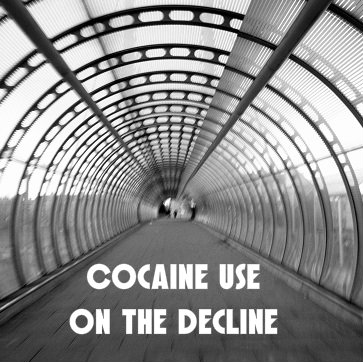 A federal agency called the Substance Abuse and Mental Health Services Administration uses a yearly project called the National Survey on Drug Use and Health to estimate the number of people in the U.S. who use any amount of cocaine in the average month. According to the most recent figures from this survey (reported in late 2013), roughly 1.6 million adults and teenagers used the drug in a representative month in 2012. This number represents about 0.6 percent of the entire U.S. population age 12 or older. Since 2002, the highest reported rate of monthly cocaine use is 1.0 percent; the rate reached this peak in three years: 2003, 2005 and 2006. Cocaine use has been trending pretty steadily downward since 2006, with a low monthly rate of 0.5 percent reported in 2011.
A federal agency called the Substance Abuse and Mental Health Services Administration uses a yearly project called the National Survey on Drug Use and Health to estimate the number of people in the U.S. who use any amount of cocaine in the average month. According to the most recent figures from this survey (reported in late 2013), roughly 1.6 million adults and teenagers used the drug in a representative month in 2012. This number represents about 0.6 percent of the entire U.S. population age 12 or older. Since 2002, the highest reported rate of monthly cocaine use is 1.0 percent; the rate reached this peak in three years: 2003, 2005 and 2006. Cocaine use has been trending pretty steadily downward since 2006, with a low monthly rate of 0.5 percent reported in 2011.
What Are The Levels Of Chronic Use?
Chronic drug users are users who consume any given substance repeatedly over time. However, not all chronic users consume drugs with the same level of frequency. On the low end, a chronic cocaine user may consume the drug from roughly four to 10 days in any 30-day time period. Moderate to heavily involved chronic users may consume the drug from 11 to 20 days within the same time period. The heaviest chronic users consume cocaine on at least 21 days within a given month. Any chronic user runs the risk of developing (or already having) diagnosable problems with cocaine abuse or cocaine addiction (both of which are classified as specific forms of a condition called stimulant use disorder). However, as a rule, heavy chronic users have the most seriously elevated risks. In addition, heavy chronic users account for a large percentage of the overall amount of cocaine consumed in any segment of the population.
How Many Chronic Cocaine Users Are There?
In the report presented to the White House Office of National Drug Control Policy, the RAND Corporation researchers used information gathered from the National Survey on Drug Use and Health, the federally sponsored Arrestee Drug Abuse Monitoring Program and several other sources to estimate the number of Americans involved in chronic cocaine use in the first decade of the 2000s. In all likelihood, the total number of chronic users in 2010 (the last year under consideration) was roughly 2.5 million. For the sake of accuracy, the report also includes a low potential figure of 1.6 million chronic users and a high potential figure of 3.9 million chronic users. Most of the chronic cocaine users (1.3 million) consumed the drug four to 10 days per month. Another 500,000 chronic users consumed the drug somewhere in the range of 11 to 20 days per month. In addition, 600,000 chronic users consumed cocaine at least 21 days per month.
Past And Present Cocaine Use
The highest reported number of likely chronic cocaine users between 2000 and 2010 was 3.3 million in the year 2000. Totals for the following six or seven years were fairly close to this peak. However, a downward trend in the number of chronic users began in 2006 and continued through the end of the period under consideration.
The estimate of cocaine use reported by the RAND Corporation is consistently higher than the estimate provided by the National Survey on Drug Use and Health. The difference between the two projects can be broadly attributed to the wider number of sources used by the RAND Corporation researchers, and more specifically attributed to the inclusion of data from the Arrestee Drug Abuse Monitoring Program (which gathered information from people who were incarcerated or otherwise involved in the criminal justice system). The RAND Corporation researchers note that total cocaine use (among both occasional and chronic users) fell by close to 50 percent between 2006 and 2010.
Find Out How An ADHD Medication Disrupts Cocaine Addiction
Denial is a classic hallmark of addiction. Addicts cause themselves harm, they damage relationships with people they love, they get into legal trouble and financial trouble as well, and yet many will claim not to have a problem with drugs or alcohol. This is called denial, and while it is not a part of every addict’s arsenal, it is a very common defense mechanism. Until the veil of this denial can be lifted, an addict is unlikely to get help. By recognizing the signs of denial you can learn to help your loved one come to the realization that he needs help.
Is It Denial Or An Outright Lie?
 Lying is a conscious act meant to deceive. Your loved one may lie to you all the time. Lying is another defense mechanism used by addicts. To hide just how bad the problem is, he may lie to you about any number of things. To be in denial, however, is different. If your loved one is in denial, he truly believes that he doesn’t have a problem. It is frustrating to deal with an addict in denial, but realize that he is not trying to hurt you. He simply can’t see the extent of his problem.
Lying is a conscious act meant to deceive. Your loved one may lie to you all the time. Lying is another defense mechanism used by addicts. To hide just how bad the problem is, he may lie to you about any number of things. To be in denial, however, is different. If your loved one is in denial, he truly believes that he doesn’t have a problem. It is frustrating to deal with an addict in denial, but realize that he is not trying to hurt you. He simply can’t see the extent of his problem.
What Is Denial?
There are several different forms that denial can take. If you are dealing with someone who is in complete denial about his problem, he is totally oblivious to the harm that his drinking or drug use is causing. You may also be dealing with a case of partial denial. Addicts who only partially believe they have a problem may recognize that their drug use or drinking is a bad habit, but may deny the issues it is causing. Perhaps the most harmful type of denial occurs when the addict fully admits to having a problem, but denies needing any alcohol abuse help.
How Can You Recognize Denial?
Addicts are very good at behaving as if everything is fine. They strive to hide the damage that their addictions cause and present a normal face to the world. If you think your loved one is in deeper than he is letting on, look for signs that he is in denial of the severity of his problem. For instance, addicts in denial do a lot of rationalizing. He makes excuses for why he drinks or uses drugs. Maybe he says that he needs to drink after work to decompress.
Those in denial also tend to minimize their problems. Without even realizing that he is being untruthful, your loved one may tell you he had just two drinks at the bar, when he really had five. Avoidance is another denial strategy. Addicts sometimes withdraw from and avoid loved ones so they don’t have to have conversations about their behaviors. Also look out for blaming and bargaining. If your loved one blames external forces, even you, for his problem, he is in denial. He may bargain with you to let him have a few drinks if he promises not to drink the next day.
Addicts are good at denial. They deny their problem to others and to themselves. They get so good at it that denial becomes another unhealthy habit and a roadblock to getting help. If you think your loved one needs help, avoid falling into the trap of believing his denials. Trust your instincts and do your best to help him see what you see. If you fail to convince him, bring in other people who care about him and consider hosting an intervention. Addiction is a serious disease, you need to break through denial in order to get treatment and find success in recovery.
Read More About How You Can Help Someone With An Addiction
14 Mar 2014
Can Diet Pills Be Addictive?
Taking diet pills to supplement weight loss can be beneficial for some people, but risky for others. If you are worried about someone you love who is taking diet pills, learn more about them and what to do to help. The Food and Drug Administration (FDA) has approved very few medications for assisting with weight loss. Many over-the-counter remedies are supplements and are not regulated. Understand the dangers and side effects that come with taking these diet aids and confront your loved one if you are worried about her health and wellbeing.
How Do Diet Pills Work?
Different diet supplements work in different ways. Most are supposed to suppress your appetite and supplements that make this claim may include green tea extract, chromium, drugs called catecholamines, or an herb called hoodia. How effective these are is uncertain.
Types Of Diet Pills
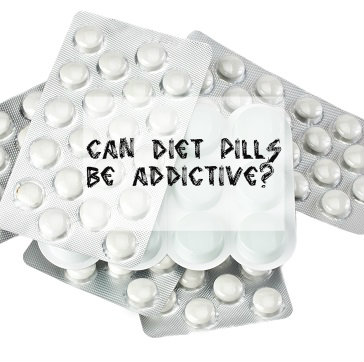 One prescription drug that works as an appetite suppressant is called phentemine.
One prescription drug that works as an appetite suppressant is called phentemine.
Another FDA-approved medication, which is available without a prescription, is called Alli. It aids in weight loss by blocking the body’s absorption of dietary fat. Other supplements claim to be able to block fat, but have not been evaluated by the FDA. They include ingredients like chitosan and guar gum.
The third and most dangerous type of diet drug includes stimulants. Stimulants are drugs that boost your metabolism causing you to burn more calories. Controversial pills, such as those that have ephedra as an ingredient, are often stimulants. Bitter orange is another herb you might see as an ingredient in a stimulant diet pill. Amphetamine, which is a prescription drug used to treat ADHD and narcolepsy, is often abused by people trying to lose weight because it is a powerful stimulant.
Are Diet Pills Addictive?
Most of the ingredients found in diet pills are not chemically addictive. In other words, unlike addictive drugs, they do not cause physiological changes to the brain that can lead to dependence. Stimulant drugs are an exception, especially amphetamine. Anyone abusing amphetamine to lose weight is putting herself at risk for addiction.
While most of the diet pill ingredients are not addictive, there is always the possibility of a psychological dependence on these medications. If someone you love is taking any type of diet pill more often than seems normal and is obsessing over her weight, she may have a type of addiction. She may also have an eating disorder or be on the path to developing one. It is important to intervene before she goes too far and really puts her health at risk.
What Are The Side Effects Of Taking Diet Pills?
There are plenty of potential side effects from all types of diet pills. Some are just uncomfortable, but others are dangerous. The riskiest side effects come from stimulants because they cause an increase in heart rate and blood pressure. When combined with alcohol, stimulants are especially dangerous. Other less serious side effects include headache, diarrhea, nausea, gas, constipation, insomnia and upset stomach.
How Can I Help If I Know Someone Who Is Overusing/Misusing Diet Pills?
If you know someone who is taking risks with diet pills, step in and express your concern. Educate your friend about the dangers of these pills, especially if she is taking stimulants. Encourage her to seek professional therapy so that she can learn how to have a healthy attitude toward her weight and her body. The best way to lose weight is through diet and exercise, so offer to be her partner in making good food choices and in working out.
Read More About Prescription Stimulant Abuse In Moms…And The Dangers
13 Mar 2014
Pregnant And Addicted – What Now?
Battling addiction and striving to achieve sobriety are some of the most difficult challenges a person can face. Addicts have to suffer through terrible withdrawal symptoms while detoxing, go through therapy and rehab and then face a lifelong struggle with the prospect of a relapse. Now imagine facing this demon while pregnant; it is the struggle that too many women encounter. Along with the difficulty of coming clean, they face the shame and embarrassment, the possibility of losing their children and unique health challenges. Getting sober is essential for the health of the mother and the baby.
What Are The Barriers To Treatment For Expecting Mothers?
 For many women who find themselves both addicted to drugs and unexpectedly pregnant, the idea of getting help is a daunting one. Women in this position tend to feel extreme guilt, shame and fear. A pregnant woman needing addiction treatment may avoid getting help for fear of being judged and vilified. She may also face the fear of losing her newborn after admitting to being an addict.
For many women who find themselves both addicted to drugs and unexpectedly pregnant, the idea of getting help is a daunting one. Women in this position tend to feel extreme guilt, shame and fear. A pregnant woman needing addiction treatment may avoid getting help for fear of being judged and vilified. She may also face the fear of losing her newborn after admitting to being an addict.
What addicted pregnant women need is compassionate care from doctors and other health professionals who understand the special needs of these patients. Without care, these women and their children will suffer. For instance, some women may try to take the matter into their own hands and quit cold turkey, which can actually be harmful to the baby.
The Consequences Of Addiction On The Fetus
For the unborn child, the consequences of a mother’s addiction can be serious. The baby will most likely be born with neonatal abstinence syndrome. This is a collection of symptoms caused by the drugs the mother uses. The baby is born addicted and then experiences withdrawal. Symptoms may include blotchy skin, poor feeding habits, irritability, diarrhea, high-pitched crying, seizures, insomnia, slow weight gain, fever, sweating, trembling and vomiting. Withdrawal in the baby is not the only concern; drug use can lead to complications during labor and delivery.
Pregnant Addicts On The Rise – Finding Solutions
As the number of people in the U.S. addicted to opioids (prescription painkillers and heroin) rises, the number of mothers and infants affected also rises. Statistics indicate that the number of babies born with neonatal abstinence syndrome has more than doubled in the last six years. In 2012, nearly 6 percent of pregnant women were using illegal drugs. The increases are being seen across the country and among all demographic groups. The healthcare costs are rising with the number of addicted babies.
Healthcare professionals are stepping up and looking for solutions to treating these women and their babies. With compassion and tested methods for treatment, they can help women feel comfortable asking for help with addiction. More hospitals and addiction centers are offering specialized care for pregnant women as the problem grows. Although many experts in the past have considered use of maintenance drugs, like methadone, to be bad for the unborn child, doctors now know that maintenance is often the best option. Withdrawal in the pregnant mother can be very dangerous for the baby.
Many of these new programs include not just cutting-edge treatment for addiction in the mother, but also the goal of continuing that care after the baby is born to ensure the mother has the best chance of staying sober and caring for her children. The programs also include plans for reducing complications during delivery and maximizing the odds of having a healthy baby. Many plans also help these new mothers with family planning and parenting skills, as well as long-term care for themselves and their children. With good care that is specialized for their needs, pregnant women have hope for a successful birth and healthy child.
Read More About Drinking During Pregnancy And Find Out Why Women Continue To Drink
Our lives today have become inextricably entwined with electronic devices. For many reasons, our cell phones, tablets and other devices have helped us. They allow us to connect more easily with others, to work on the go or work at home, and to access more information. There are downsides too. Becoming addicted to using your devices is a real possibility. We can become so dependent on them that it gets difficult to put them down or to turn them off.
 According to studies, being addicted to your cell phone is similar to other impulse control disorders, like compulsive shopping. All activities linked to our phones can lead us to use them obsessively. This includes texting, surfing the Internet, emailing and playing games. Using devices can start to take over your life, but if you are aware of the issue and your own usage, you can prevent it
According to studies, being addicted to your cell phone is similar to other impulse control disorders, like compulsive shopping. All activities linked to our phones can lead us to use them obsessively. This includes texting, surfing the Internet, emailing and playing games. Using devices can start to take over your life, but if you are aware of the issue and your own usage, you can prevent it
On reading this, you may feel immediately defensive. Maybe you don’t think you use your devices to an excessive degree. Find out just how much you are on them by keeping a log. Keep a notebook handy or a note writing app on your Smartphone, and record the time you spend doing anything on your phone, tablet or computer that is not directly related to work or actual phone calls. You may just be surprised by how much time you are texting, checking Facebook updates and Tweets, or checking on emails. Imagine what else you could do with all that time.
Can You Limit Device Use In Certain Situations?
A major irritant of modern life is when people use their phones in inappropriate situations. Checking your texts at dinner, at the movies or when in the middle of a conversation with a real, live person is inconsiderate. If you struggle to turn away from your phone in these situations, you could have a problem. Set a goal for yourself of resisting those urges. When you are with a friend or your family, tell them that you are trying to limit yourself and encourage them to call you out when you slip up. Their support will help you.
Can You Unplug For An Hour?
Test the extent of your devotion to your devices by trying to leave them alone for just one hour when you’re alone and have no one to distract you. Turn off your phone, put your tablet in a drawer, turn off your computer, and walk away. Pick up a book or magazine, bake something, watch a movie, or do anything else for an hour and see how it feels.
If you are disturbed by constant urges to check your texts, your emails, or your social media pages, you may have the beginnings of a device addiction. If you can get past those urges, however, and spend the hour avoiding your devices, it will make a difference. Try to do this once a day, and even twice a day to get some space between you and your gadgets.
Device addiction in all its forms—Internet, gaming, texting—is a real thing. You can become too attached to your gadgets and what they represent: connection. It’s OK, and even healthy, to disconnect for periods of time. Unplug and do something else and you may just find that you had been neglecting other hobbies and activities you enjoy. You may also find that you were failing to connect with people in the real world. As long as you are aware and make a point to limit yourself, you can avoid the dreaded device addiction.
Read More About Internet Risks And Addictions
If you have had a child diagnosed with attention deficit hyperactivity disorder (ADHD) you probably have a lot of questions and just as many concerns. We hear a great deal in the media about over-medicating children. What does this mean for your child and his disorder? Will using medications to help him focus put him at risk for further drug abuse, and even addiction? The answers to these questions are not simple, but the more you learn about ADHD medications and treatment, the more comfortable you will be making decisions in the best interest of your child.
How Do Medications Help Children With ADHD?
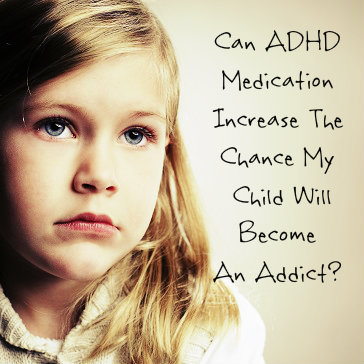 ADHD is a disorder that is characterized by difficulty focusing and paying attention, impulsive and inappropriate behaviors and hyperactivity. These often manifest during school hours making academic success a major challenge for kids with ADHD. Medications used to treat the disorder are stimulants. This may seem counterintuitive, but they dramatically reduce hyperactive impulses, and allow children to focus and pay attention. For the best results, a combination of medication and behavioral therapy is often recommended by experts.
ADHD is a disorder that is characterized by difficulty focusing and paying attention, impulsive and inappropriate behaviors and hyperactivity. These often manifest during school hours making academic success a major challenge for kids with ADHD. Medications used to treat the disorder are stimulants. This may seem counterintuitive, but they dramatically reduce hyperactive impulses, and allow children to focus and pay attention. For the best results, a combination of medication and behavioral therapy is often recommended by experts.
Are ADHD Drugs Addictive?
Stimulants used to treat ADHD, including Adderall and Ritalin, are addictive. Like other addictive drugs, they produce a pleasurable sensation related to certain brain chemicals. If these drugs are abused over time, the user can become addicted. When taken as directed, however, the risk of becoming addicted to these drugs is low.
If you monitor your child’s intake of his ADHD medications and follow your doctor’s instructions carefully, there is little chance that he will become addicted. It is natural to be concerned about the possibility. If it makes you more comfortable, keep the medication locked away and give the right dose to your child when he needs it. By controlling the administration, you can be certain he is not taking more than he is supposed to.
Does Use Of ADHD Drugs Lead To Further Drug Abuse?
There has been some debate about whether or not being medicated with stimulants for ADHD puts children at risk for later drug abuse. The best answer so far, thanks to researchers, is no. There seems to be little to no evidence that using ADHD medications as directed will lead to experimentation with other drugs, or addiction.
The greater danger results from the misuse of ADHD medications as a study drug. Teens and young adults, especially those in high school and college, abuse prescription stimulants as an aid to both studying and partying. One major reason for this abuse is that the medications have the effect of helping them stay awake. If a student needs to cram for an exam, she might take Adderall to stay up all night. Some students even take the medications to stay up late for the purpose of partying all night long. Both habits are very risky because they involve using addictive drugs without supervision from a doctor. This behavior can lead to addiction and other health problems.
Making Sure All Of Your Questions Are Answered When It Comes To ADHD Meds
The bottom line is that your child with ADHD could benefit greatly from supervised use of stimulant medications. If your doctor wants your child to try one, make sure all of your questions are answered and your concerns are addressed, but rest assured that using these drugs will not make your child an addict or a future drug abuser. Supervise your child, explain to him the dangers of abusing any kind of drug, and speak to your doctor to make sure that you and your child feel comfortable going forward with treatment.
Learn More About The ADHD And Drug Abuse Connection
27 Jan 2014
How to Avoid Substituting Your Addiction
A substitute addiction is a substance, activity or behavior that replaces a previous addiction. Acquiring a substitute addiction is not uncommon for those in recovery from drug or alcohol dependence. Being an addict takes up the biggest portion of your life.
When you are addicted to drugs or alcohol, you obsess over getting more, you earn money just so you can buy more, you try to hide your habit, and you fight with loved ones about it. In other words, addiction takes over your life. When it is gone, it may feel like you have a void in your life that needs filling. It is possible to fill that hole with positive activities and healthy relationships, but if you’re not careful, you may just slip into another addiction.
Are Substitute Addictions Always Bad?
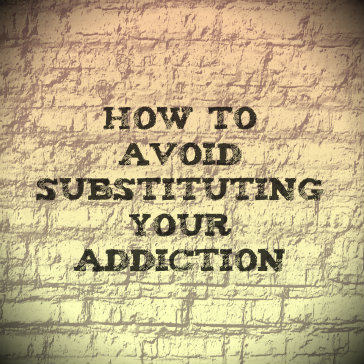 For some addicts in recovery, a substitute addiction may start out as a healthy new activity. Maybe you have taken up an exercise regimen, or you have started going to church again. Perhaps you are ready to devote yourself to your job and to getting a promotion. None of these are bad ideas, but they can become unhealthy obsessions and even approach the level of a behavioral addiction if you do not monitor your behaviors.
For some addicts in recovery, a substitute addiction may start out as a healthy new activity. Maybe you have taken up an exercise regimen, or you have started going to church again. Perhaps you are ready to devote yourself to your job and to getting a promotion. None of these are bad ideas, but they can become unhealthy obsessions and even approach the level of a behavioral addiction if you do not monitor your behaviors.
Not all addicts will develop these substitute addictions, but it is possible. There are underlying reasons you became an addict in the first place. These reasons may cause you to take up a new obsession when the first one has gone away. It is important that you find new ways to expend your energy after getting sober, but be aware of the possibility of a substitute addiction and remember that moderation is key.
How Can You Recognize A Substitute Addiction?
Because many of these substitute addictions start out as a healthy and positive new activity, it can be tough to tell when you are approaching a level of unhealthy obsession. If you became clean from prescription drugs, and then turn to drinking alcohol, the presence of a substitute addiction is obvious. Becoming obsessed with exercise or work is less so.
Listen to your loved ones and your support network. If people who care about you are telling you that you are becoming obsessed with your new hobby, you should listen. It is often easier to recognize a substitute addiction in someone else than it is to see it in yourself.
Be aware of your feelings and your motivations. If you went through a good rehab program, you learned to be aware of why you became an addict and how addiction changed your emotions and moods. If you notice similar feelings and motivations in your new hobbies or activities, it’s time to rethink what you’re doing.
How To Strike A Balance In Sobriety
Just because substitute addictions are a possibility in your new, sober life does not mean that you should not get involved in new activities. To avoid obsessing or developing a replacement for your addiction, learn to be more balanced. Instead of getting heavily involved in one activity, try several. Spread yourself out and try a lot of new things. You can always whittle your new activities down to two or three, but don’t allow all of your time to be taken up by just one.
Make sure your new activities don’t get in the way of the responsibilities you have. Make sure you keep time set aside for your relationships, your chores, and anything else you need to do. Let your loved ones help you through this process. With their support you can learn to be balanced and healthy while staying free of any kind of addiction.


